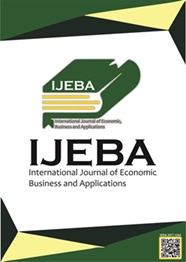The Performance Of Knowledge Transfers In University
Abstract
The aim of this study is expected to be able to answer the research problem is how to improve the performance of knowledge transfer in the public sector. The sampling technique used in this study is the purposive sampling method. This manner takes 100 samplSe with a specific set of criteria education staff with a bachelor's degree in five colleges located in Kebumen District, Center Java, Indonesia. The result of the data processing with SPSS 25 shows that partially, the quality of human resource management and information technology competence had a positive effect on the quality of knowledge assets. The result showed that the quality of knowledge assets had positive effects on the performance of knowledge transfer. Finally, quality of knowledge assets roles as an intervening roles in this research
Keywords
Full Text:
PDFReferences
Albino, V., Garavelli, A. C., & Gorgoglione, M. (2004). Organization and technology in knowledge transfer. Benchmarking: An International Journal.
Argote, L., McEvily, B., & Reagans, R. (2003). Managing knowledge in organizations: An integrative framework and review of emerging themes. Management Science, 49(4), 571–582.
Bloodgood, J. M., & Salisbury, W. D. (2001). Understanding the influence of organizational change strategies on information technology and knowledge management strategies. Decision Support Systems, 31(1), 55–69.
Carmeli, A., & Spreitzer, G. M. (2009). Trust, connectivity, and thriving: Implications for innovative behaviors at work. The Journal of Creative Behavior, 43(3), 169–191.
Cheng, M.-Y., Ho, J. S.-Y., & Lau, P. M. (2009). Knowledge sharing in academic institutions: A study of multimedia university Malaysia. Electronic Journal of Knowledge Management, 7(3).
Cohen, W. M., & Levinthal, D. A. (1990). Absorptive capacity: A new perspective on learning and innovation. Administrative Science Quarterly, 128–152.
Darr, E. D., & Kurtzberg, T. R. (2000). An investigation of partner similarity dimensions on knowledge transfer. Organizational Behavior and Human Decision Processes, 82(1), 28–44.
Liebowitz, J., & Yan, C. (2004). Knowledge sharing proficiencies: the key to knowledge management. In Handbook on Knowledge Management 1 (pp. 409–424). Springer.
McCuiston, V. E., & Jamrog, J. J. (2005). Knowledge management implementation: HR executives speak out. Journal of Applied Management and Entrepreneurship, 10(1), 20.
McGill, T. P. (2006). Harnessing intellectual capital: A study of organizational knowledge transfer. Touro University International.
Minbaeva, D., Pedersen, T., Björkman, I., Fey, C. F., & Park, H. J. (2003). MNC knowledge transfer, subsidiary absorptive capacity, and HRM. Journal of International Business Studies, 34(6), 586–599.
Narasimha, S. (2000). Organizational knowledge, human resource management, and sustained competitive advantage: Toward a framework. Competitiveness Review: An International Business Journal.
Perri, M. (2006). The drama of knowledge transfer in a merger environment: a case study. Concordia University.
Ray, L. L. (2008). Requirement for knowledge management: business driving information technology. Journal of Knowledge Management.
Rhodes, J., Lok, P., Hung, R. Y., & Fang, S. (2008). An integrative model of organizational learning and social capital on effective knowledge transfer and perceived organizational performance. Journal of Workplace Learning.
Seleim, A. A. S., & Khalil, O. E. M. (2011). Understanding the knowledge management‐intellectual capital relationship: a two‐way analysis. Journal of Intellectual Capital.
Swart, J., & Kinnie, N. (2003). Sharing knowledge in knowledge‐intensive firms. Human Resource Management Journal, 13(2), 60–75.
Syed‐Ikhsan, S. O. S., & Rowland, F. (2004). Knowledge management in a public organization: a study on the relationship between organizational elements and the performance of knowledge transfer. Journal of Knowledge Management.
Van Den Hooff, B., & De Ridder, J. A. (2004). Knowledge sharing in context: the influence of organizational commitment, communication climate and CMC use on knowledge sharing. Journal of Knowledge Management.
Von Krogh, G., Ichijo, K., & Nonaka, I. (2000). Enabling knowledge creation: How to unlock the mystery of tacit knowledge and release the power of innovation. Oxford University Press on Demand.
Wilkesmann, M., & Wilkesmann, U. (2011). Knowledge transfer as interaction between experts and novices supported by technology. Vine.
Zhang, Z. (2005). Managing knowledge assets in organizations: Role of incentives and information systems. University of Pennsylvania.
DOI: http://dx.doi.org/10.31258/ijeba.6.2.57-64
Refbacks
- There are currently no refbacks.





.png)
.png)
.png)


